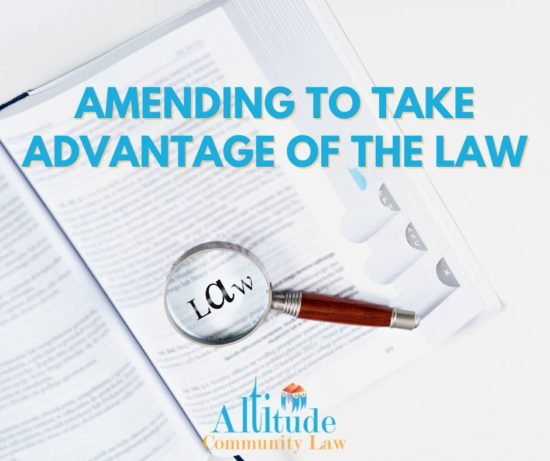
Did you know that Colorado law provides associations, directors, and officers with certain rights and protections that may only be utilized if appropriate verbiage is contained in the governing documents? Below are four examples of such rights and protections that must be contained in an association’s governing documents for an association, its directors, and/or officers to be able to take advantage of them.
- Limiting Liability of Directors and Officers
The Colorado Revised Nonprofit Corporations Act (“Nonprofit Act”) allows associations to limit personal liability of directors and officers if the articles of incorporation contain appropriate language. Specifically, the articles of incorporation may contain language eliminating or limiting a director’s or officer’s personally liability associated with allegations of breach of fiduciary duty. However, liability may not be eliminated in the following circumstances:
(a) any breach of the director’s duty of loyalty to the association or its members;
(b) acts or omissions not in good faith or that involve intentional misconduct or a knowing violation of the law; or
(c) any transaction from which the director directly or indirectly derived an improper personal benefit. In order to take advantage of this provision, the limitation must be included in the association’s articles of incorporation.
Having such a protection in the articles of incorporation is a fundamental “layer of protection” directors should have. Because let’s face it, the pay just isn’t enough.
- Right of Directors to Issue Proxies
Pursuant to the Nonprofit Act, directors cannot issue proxies for board meeting unless such authority is contained in the bylaws. This means if your bylaws do not address or mention director proxies (not to be confused with membership proxies at annual or special meetings of owners) your board members cannot assign their rights to vote at board meetings to other directors.
Keep in mind, however, even if your bylaws do contain authority for directors to issue proxies, such right is limited by the Nonprofit Act as follows:
- proxies may only be issued to other directors on the board; and
- proxies must be directed (i.e. instruct the proxy-holder how to vote).
If your board members regularly vote via proxy, it is important to review the community’s bylaws to ensure such authorization exists. If your bylaws do not address director proxies, you will need to immediately stop use of the proxies unless/until the bylaws are amended.
- Right to Pledge Income Stream as Security for a Loan (post-CCIOA)
According to the Colorado Common Interest Ownership Act (“CCIOA”), communities created after July 1, 1992, may only pledge their income stream (i.e. the right to collect assessments) as security for a loan if such authority exists in the association’s declaration. If the declaration is silent on this issue, the pertinent association cannot legally pledge the right to collect assessments as security.
What is the significance of this? The significance is that currently banks only accept associations’ income streams as security for loans, so if an association cannot lawfully pledge its income stream, it effectively, cannot take out a loan. If your community is considering the possibility of taking out a bank loan in the near future, and the community was created after July 1, 1992, make sure your declaration addresses this issue before starting down the road of applying for the loan.
If no such authority is contained in the declaration, it may be time to consider an amendment.
- Right to Grant Easements Over Common Elements (pre-CCIOA)
Pursuant to CCIOA, the right to grant easements over common elements automatically exists (even if governing documents are silent) for communities created after July 1, 1992. However, such rights do not exist for communities created prior to that date unless such authority is contained in the declaration.
The right to grant easements over common elements is an important one as it allows associations to enter into easement agreements with owners to extend their decks onto common elements, as well as allowing contractors to come onto the common elements to perform work and installing equipment. The right to grant easements also impacts an association’s ability to contract with metro districts to perform maintenance on common elements.
If your community was created before July 1, 1992, and your declaration does not contain the right to grant easements, it may be in your association’s best interests to consider amending the declaration.
For more information on taking advantage of statutory provisions, please contact an Altitude attorney at 303.432.9999 or at [email protected].